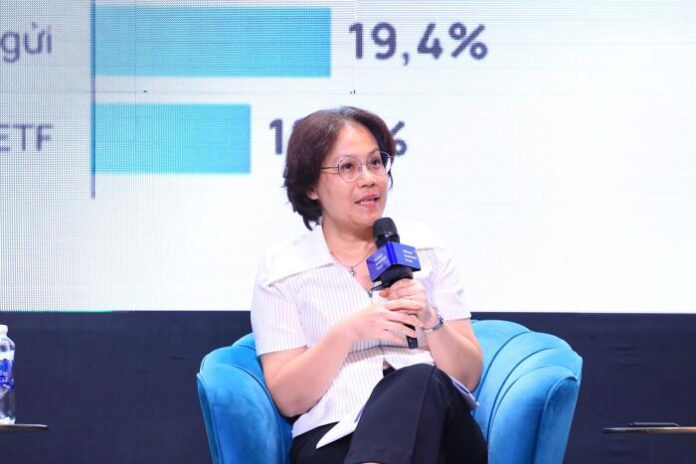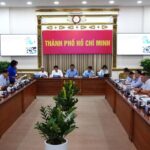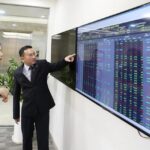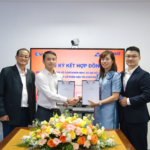Speaking at the Vietnam Investment Forum 2025, hosted by Vietnambiz on the afternoon of June 3rd, Ms. Thieu Thi Nhat Le, CEO of UOB Asset Management (Vietnam), shared her insights on investment strategies amidst the current macroeconomic landscape.
“We prioritize sectors and businesses with intrinsic strengths in Vietnam while refraining from investing in export-related industries,” Ms. Le informed the audience.
CAUTION WITHOUT MISSING OPPORTUNITIES
This cautious approach, however, does not mean missing out on opportunities. Thus, the representative from UOB Asset Management emphasized the importance of closely monitoring market developments to seize opportunities during sharp downturns, such as in early April when valuations became more attractive after the market’s fall due to the US announcing countervailing duties.
“This is the time for long-term investors to deploy capital into solid businesses with growth potential, especially as the government boosts public investment and removes institutional bottlenecks toward the goal of achieving an 8% GDP growth rate in 2025,” Ms. Le highlighted.
Echoing the importance of thorough analysis for prudent investment decisions, Ms. Trinh Quynh Giao, CEO of PVI Asset Management, recalled the market’s “shock” reaction to the US countervailing duty policy in early April. However, from a practical investment perspective, institutional investors focused on assessing the policy’s impact on specific sectors and businesses’ ability to navigate fluctuations. Hence, in an era where “uncertainty has become the new normal,” Ms. Giao mentioned that institutional investors opted for robust businesses unaffected by short-term volatility.
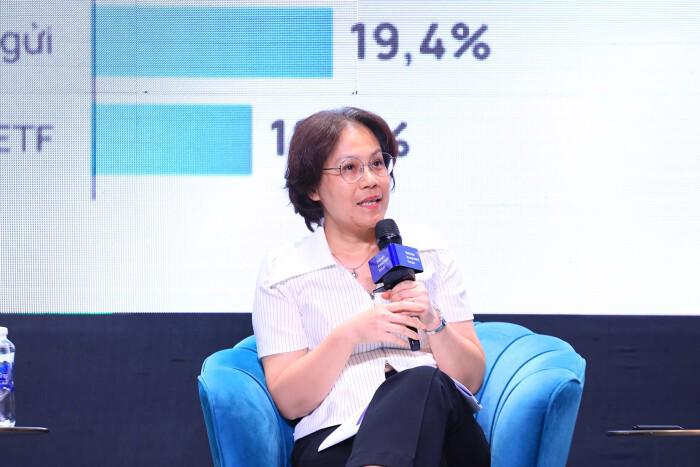
Regarding portfolio management, Ms. Duong Kim Anh, Investment Director of Vietcombank Fund Management Company (VCBF), shared VCBF’s strategy of selecting individual companies (bottom-up) rather than a top-down allocation approach.
She acknowledged the significant impact of tariffs on textile, seafood, wood processing, and industrial park businesses (due to their FDI reliance). However, she emphasized the necessity of evaluating each company individually, as “while all enterprises are affected, the extent of impact varies.”
Consequently, VCBF will increase its holdings in export-oriented businesses with diverse markets, complex order processing capabilities, and industrial parks focusing on ESG or possessing valuable land banks…
Meanwhile, UOB Vietnam focuses on sectors predominantly operating in the domestic market and companies benefiting from government policies and strategic priorities, especially in public investment. Favored sectors include banking (given high credit growth targets and public investment benefits), construction and building materials (due to infrastructure development), retail and consumer discretionary (given robust domestic consumption), real estate (as the government removes legal obstacles), technology, and logistics.
UNTAPPED MARKET POTENTIAL
Mr. Le Hoai Anh, Executive Director of Affinity Equity Partners, offered an optimistic perspective based on his successful investment experience during Vietnam’s most challenging periods.

Citing successful deals with Vingroup and Vincom Retail amid a volatile market, the representative from Affinity Equity Partners shared that investments made during Vietnam’s most challenging times turned out to be their most prosperous. Thus, Mr. Anh believes that Vietnam currently possesses very favorable intrinsic conditions, especially in terms of policies, presenting significant opportunities for businesses focusing on the domestic market.
Regarding US tariffs, Mr. Anh concurred that there wouldn’t be a blanket tax rate for all goods. He predicted that labor-intensive manufacturing sectors like textiles and footwear would not face excessively high taxes and might even benefit from production shifts from China to Vietnam.
However, for electronic products and mobile phones, the tax rate could be higher. Still, if Vietnam’s tax rate remains competitive with other countries, and large corporations like Samsung have no reason to relocate, they will stay. He also noted that FDI shifts could result from other countries offering lower tax rates rather than increases.
Additionally, according to Mr. Anh, several geopolitical factors currently favor Vietnam:
Firstly, President Trump has a favorable disposition towards Vietnam, and his tariffs are not exclusively targeted at the country.
Secondly, the Vietnam-US Comprehensive Partnership benefits businesses in both countries.
Thirdly, many Vietnamese products are not on the list of items that the US intends to produce domestically, and the shift of production from China to Vietnam aligns with Trump’s strategic intentions.
Lastly, a stable Vietnam contributes to regional stability, creating a “win-win” relationship, which the US values.
Hence, Mr. Anh believes that the tax rates may not be as pessimistic as feared and could even be positive, positioning Vietnam as a potential “case study” for the success of Trump’s trade doctrine.
6 Value Streams Crafting River Park’s Identity at LA Home
On June 3rd, leading developer Prodezi and their partners at Huong Viet Holdings (HVH) unveiled the latest addition to the LA Home eco-urban project: River Park. This new development promises to be a pivotal piece in the 100-hectare eco-city puzzle, offering a unique and innovative take on modern living.
The City of Ho Chi Minh: Economy Booms, FDI Surges, and Investment Confidence Restored in the First Five Months
Amidst a tapestry of challenges, Ho Chi Minh City’s economy in the first five months of 2025 displayed promising resilience. Foreign direct investment (FDI) inflows reached an impressive $1.8 billion, reflecting an 87.5% surge compared to the same period last year. This, coupled with stable macroeconomic indicators and a gradual recovery in investor confidence, paints a picture of enduring economic vitality for the city.
The Stock Market in June: What to Expect After a Brilliant May
The VN-Index ended May with the strongest gain since the beginning of the year, but it now faces profit-taking pressure at the old peak. Analysts remain cautious, suggesting that the market will continue its accumulation trend to absorb profit-taking selling pressure while awaiting new supportive information.

